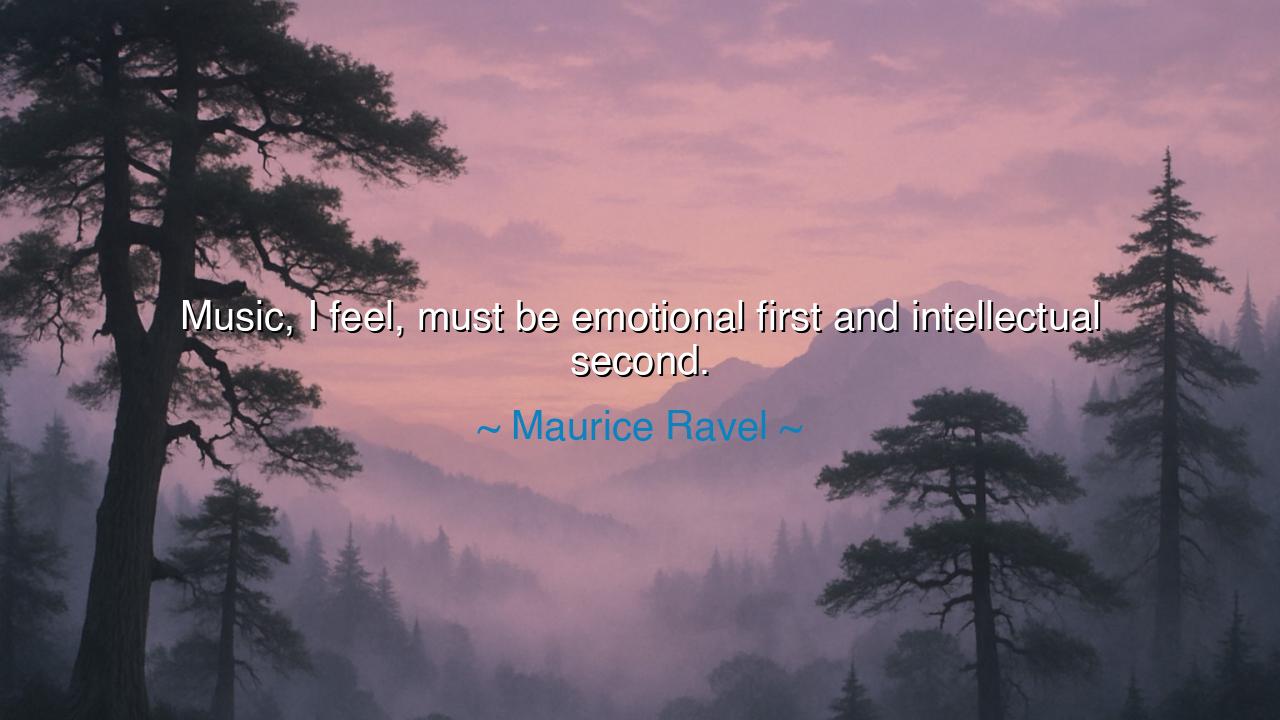
Music, I feel, must be emotional first and intellectual second.






When Maurice Ravel declared, “Music, I feel, must be emotional first and intellectual second,” he gave voice to a truth that lies at the heart of all art: the spirit must be touched before the mind is engaged. His words remind us that art which speaks only to the brain may impress, but it does not live; while art that awakens the heart endures through centuries. For Ravel, the mastery of craft and technique was never denied—indeed, he was a master of structure and form—but he placed them as servants to feeling, not as its masters.
The ancients understood this order well. When the bards of Greece sang the epics of Homer, their listeners did not first measure the rhythm or analyze the meter. They wept at the grief of Achilles, they longed for the homecoming of Odysseus. Emotion was the doorway, and through it, intellect followed. Ravel’s wisdom is thus as old as the lyre: that the purpose of music is to move the soul, to stir the passions, and only afterward to reveal its architecture to the mind.
Consider Ravel’s own works. His famous “Boléro” is almost absurdly simple in form, a single theme repeated endlessly with growing force. Intellect alone might dismiss it as monotony, yet to the listener it becomes hypnotic, relentless, and overwhelming—a rising wave of emotion that sweeps the heart before the mind can speak. Here, Ravel proves his own creed: feeling first, structure second. The intellect comes later, marveling at the precision of orchestration, but it is the emotion that seizes us in the moment.
History gives us further witness. Beethoven, though a master of counterpoint and form, said that music was “a higher revelation than all wisdom and philosophy.” His symphonies do not begin by appealing to the intellect—they begin by shaking the soul. The first notes of the Fifth Symphony are not an argument, they are a blow to the chest. Only later do scholars analyze its construction, but in the instant of hearing, it is pure emotion. Beethoven and Ravel, though different in style, both understood the order of power: the heart first, then the mind.
There is also a warning hidden in Ravel’s words. Too often, creators become slaves to intellect, seeking to impress with cleverness or technical brilliance, forgetting that art is meant for human beings, not machines. A piece of music that dazzles but does not move is like a statue without breath—perfect in proportion, but lifeless. Ravel reminds us that true artistry is measured not by applause from scholars, but by tears in the eyes of the listener, by the way the song lingers in the soul long after it has ended.
The lesson for us is profound: in all forms of expression, whether in music, writing, or even in daily life, we must reach the heart before we reach the mind. If you speak, let your words carry warmth as well as reason. If you create, let your work breathe feeling before structure. If you live, let your actions be guided first by compassion, then by calculation. For what is reason without love, or structure without spirit? It is nothing but an empty shell.
Practically, this means daring to create with sincerity. Do not fear if your art seems too simple at first, or if your words tremble with rawness. It is better to move one soul deeply than to impress a hundred minds shallowly. Learn your craft, yes—study, practice, refine—but never forget that your intellect is only the servant of your emotion. The heart is the true throne of beauty, and all art must kneel before it.
Thus, Ravel’s declaration is both a guide and a commandment for every generation: let music—and all art—be emotional first and intellectual second. Touch the heart, and the mind will follow; but touch the mind alone, and the heart will wander away. This is the order of truth, the order of beauty, the order by which all great works endure.






AAdministratorAdministrator
Welcome, honored guests. Please leave a comment, we will respond soon